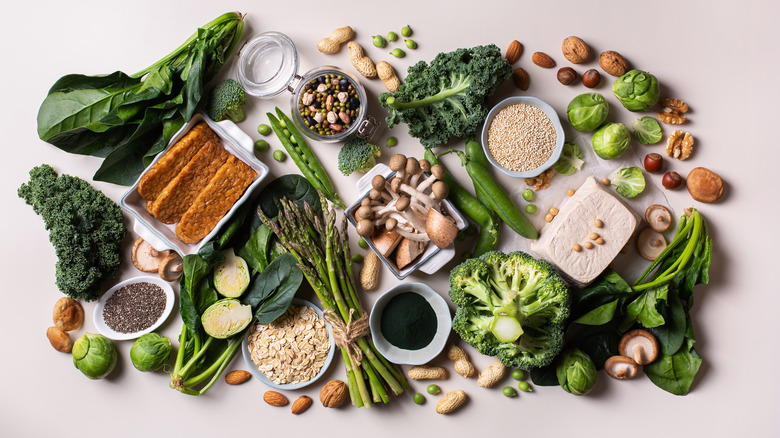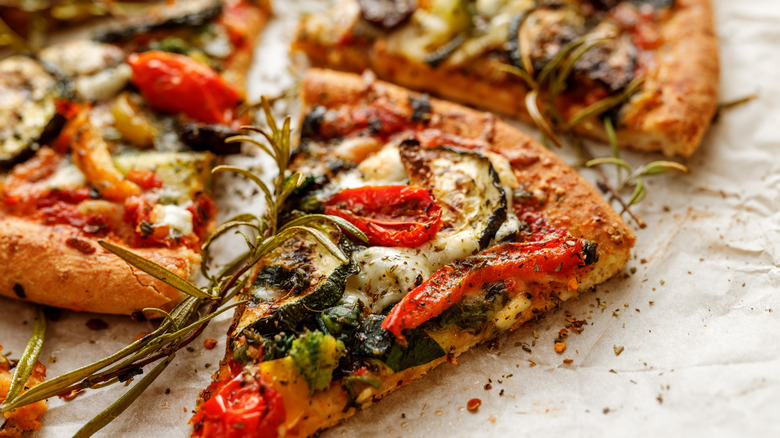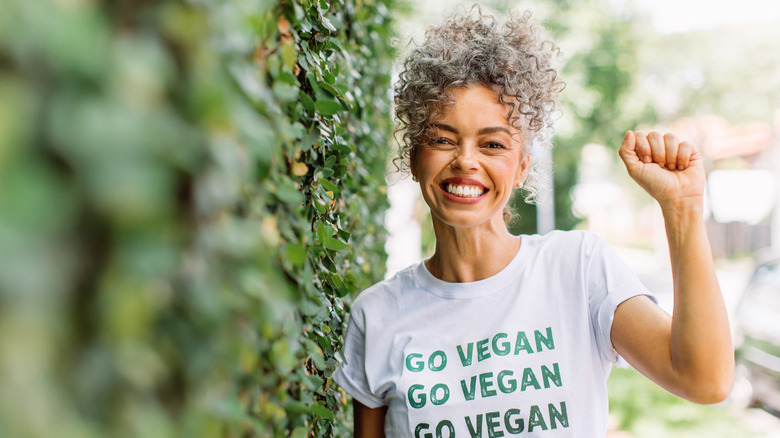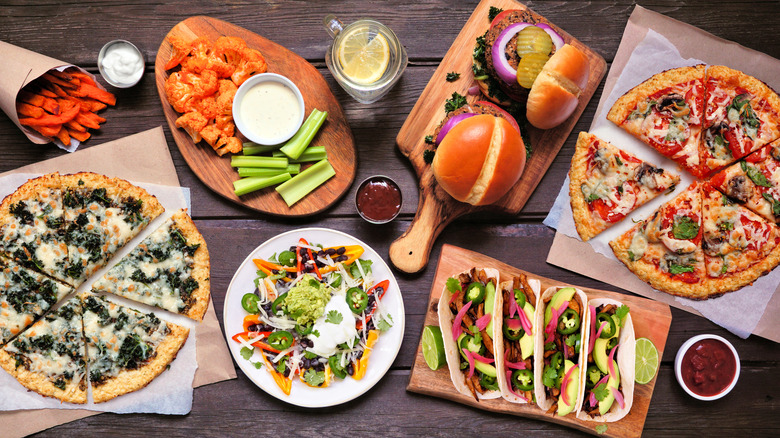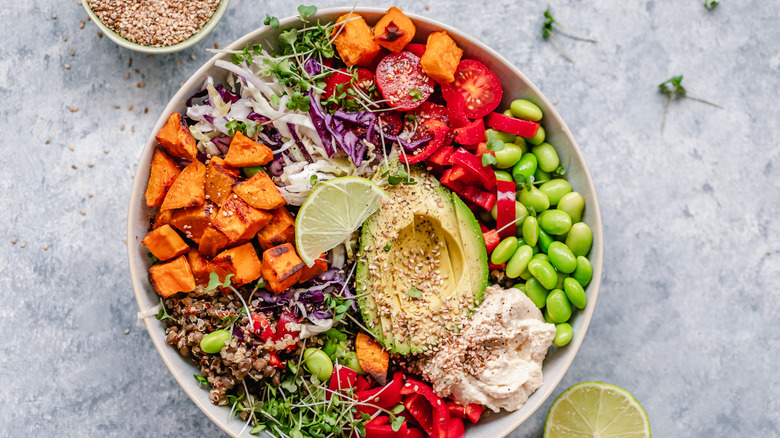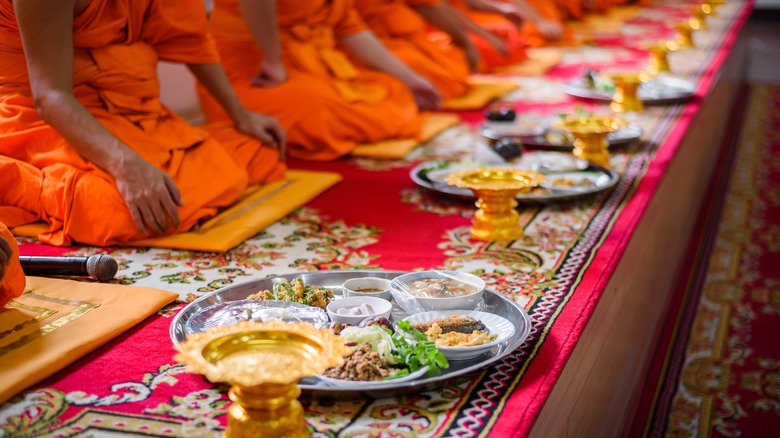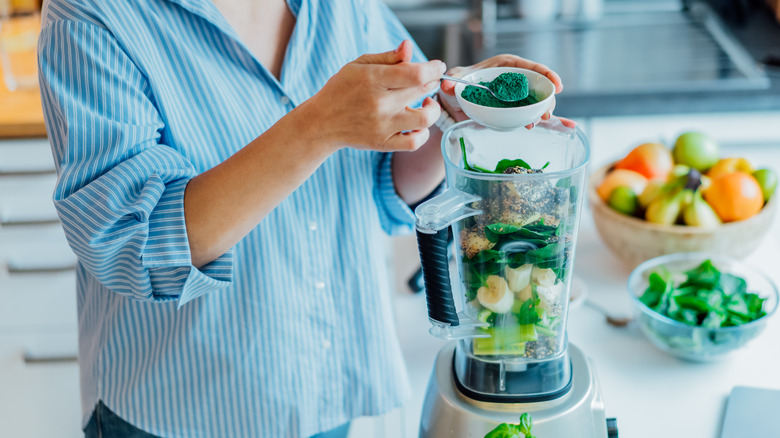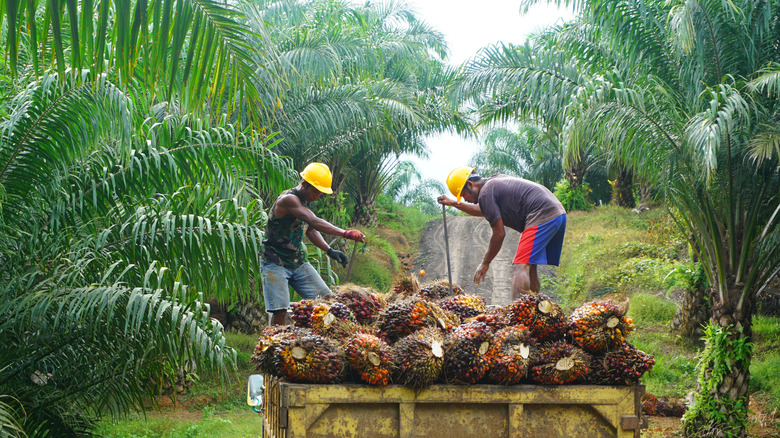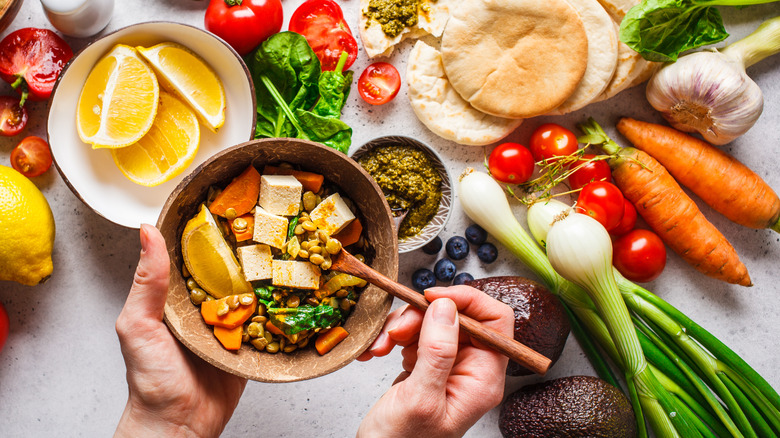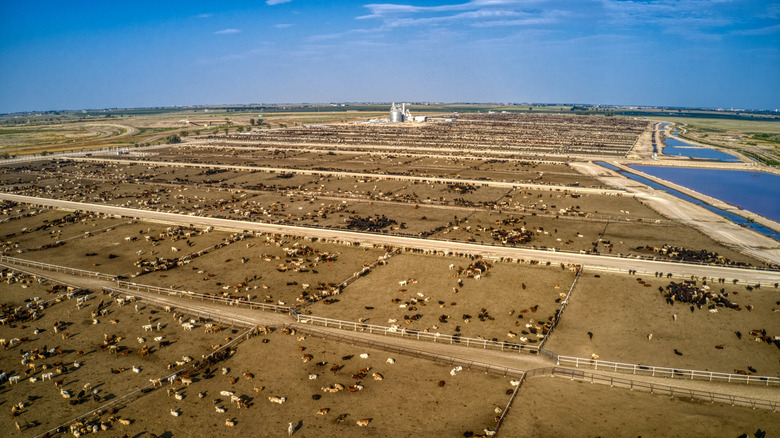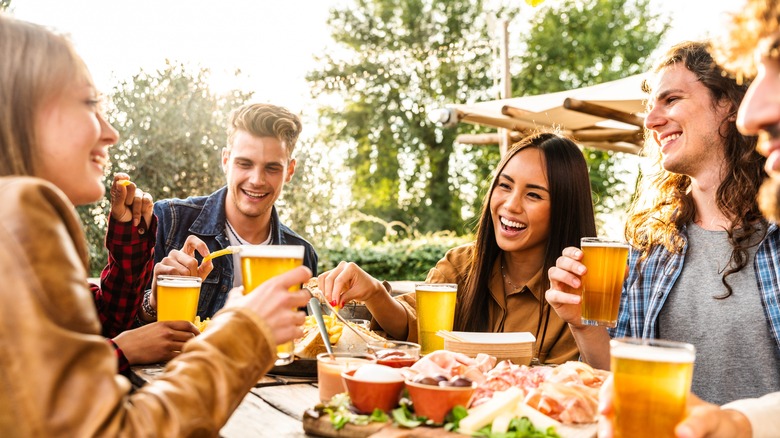The Important Differences Among Vegetarian, Vegan, And Plant-Based Diets
It seems that almost everyone these days follows some kind of diet. Whether due to allergies, health, preferences, or ethics, it's hard to find something that can be universally consumed. However, there is a popular trend that's been slowly building for decades of reducing meat intake. It's quite easy to find common ground on this topic, and even those who haven't reduced the quantity of meat they eat understand some of the benefits. As it becomes more mainstream, you may find yourself lost in the lingo and subcategories of vegetarianism. It's not just about meat anymore, so it's important to understand the differences between vegetarian, vegan, and plant-based diets.
As consumers begin to demand tasty meat-free options, the manufactured food industry has taken notice. Not far behind is the demand for dairy-free alternatives, and it's almost difficult to find a grocery store that doesn't cater to those options nowadays. Even die-hard meat fans have been known to follow their curiosity and indulge in a plant-based patty now and again, and who wouldn't dip their chip into a vat of hot and spicy cashew queso? Everyone follows their diet differently, but there are major differences between the popular meat-free diets worth exploring. Saddle up because we have all the ins and outs when it comes to vegan, vegetarian, and plant-based dieting.
Vegetarians eat animal byproducts
Vegetarians are simply people that abstain from eating meat which includes land, sky, and water animals. They may choose to not eat meat for health, religious, environmental, animal welfare, or even personal reasons. Some vegetarians are animal activists and refuse to wear leather or purchase non-edible products that contain a part of an animal, like sinew. Others cut back on their meat intake because of the toll factory farming and overfishing take on the environment, while many vegetarians stopped eating meat because they find their bodies feel healthier without it or have been advised to by a doctor. Plenty of religions abstain from animal products, either from all types of animals or from specific species in particular. Whatever the reason for their dietary choices, vegetarians have been around since the beginning of humankind and continue to be an influential part of society today.
Famous historical figures like Leonardo Di Vinci, Mahatma Gandhi, Franz Kafka, and Leo Tolstoy were just a few of histories well-known vegetarians. With a large movement in the United States in the '70s, and with today's influx, America has never been more meat-free. Vegetarians, however, do eat eggs and dairy products, as well as use animal by-products like goat's milk soap or beeswax candles in their day-to-day lives.
Veganism is a movement, not a diet
While many folks categorize veganism as a diet, it's actually an ethical movement to prevent cruelty against animals and environmental degradation and goes way beyond food. Vegans believe that not only is killing animals for human pleasure wrong, but using live animals for their products is cruel as well. These byproducts include eggs, dairy, beeswax, wool, and honey. Any product that uses a part of an animal or a byproduct in its production process is also excluded from the vegan lifestyle including wines that have been purified with fish bladders, self-care products that have been tested on animals, or even white sugars that have been purified with bone char. Because there are so many products out there that include the use of the bodies of animals against their will, vegans strive to avoid them to the best of their ability but understand that it would be nearly impossible to hurdle every obstacle.
Because veganism is not widely understood in the United States there are plenty of myths about veganism out there that deserve some debunking. For instance, it is widely misunderstood that vegans don't get enough protein, and feel deprived of their seemingly limited food options. Another is that vegans dislike meat eaters. While some vegans do try to get their meat-loving friends to change lifestyle, many just choose to live in a world where they don't personally contribute to animal cruelty.
Plant-based dieters are mostly health-driven
Those who follow a plant-based diet are actually quite different from vegans in a few ways. While both groups abstain from meat, dairy, and eggs, plant-based dieters don't particularly avoid animal products that are inedible. For instance, someone on a plant-based diet may wear leather, wash their hair with shampoo tested on animals, and enjoy non-vegan wines. This is because they are mostly diet-driven, and the main focus is on keeping their body healthy by abstaining from animal products. And they really are onto something, a new study reveals impressive potential health benefits of a plant-based diet.
Plant-based dieters enjoy the benefits of an anti-inflammatory diet that's free from cholesterol, added antibiotics, and hormones, as well as natural hormones like those found in milk. Certain cancers and other non-communicable diseases like diabetes, obesity, and autoimmune disorders are less prevalent in those abstaining from animal products. They enjoy a plethora of fruits, vegetables, nuts, seeds, and grains and even indulge in processed foods like chips, bread, vegan ice creams, and plant-based meats.
Whole food plant-based dieters don't eat processed foods
Whole-food plant-based dieters, also known as those on a WFPB diet, are quite similar to plant-based dieters except for one food group. The WFPB diet discludes any processed or refined foods, and sticks to eating only whole foods as their title suggests. This way of eating can seem quite complicated for someone just wrapping their mind around what qualifies as plant-based, but there are a few simple tricks you can use to determine if something is a whole food or not. Is the food you're looking at in its whole form, even if it's changed appearance? If not, then it is not WFPB.
For instance, an orange is a whole food and remains a whole food when blended. But, when it's strained into a pulp-free juice, you're removing fiber from the mixture and therefore it becomes refined. Olives are whole food, but when pressed into olive oil they become refined. The same goes for sugar cane versus sugar. WFPB dieters put a lot of emphasis on including fiber in their diet, and when it's stripped from a product it no longer fits into that diet. The same goes for nutrient density. While the diet may seem restrictive, there are plenty of workarounds to enjoy sweet and fatty foods including the frequent use of date sugar (made with whole dates), and nut butter and creams which can make the food quite rich.
Flexitarians try to avoid meat
Because these diets are so popular, but not everyone has dove in head-first to the movement, there are plenty of people out there simply looking to reduce their meat and dairy intake. Rarely do people go full turkey right off the bat, and some never make a 100% commitment to a specific diet. For those just figuring it out, or who are content with reducing their animal product intake to a minimum, the term "flexitarian" comes in handy. They stick to the saying "Everything in moderation" and don't get caught up in boxing themselves into a certain label.
This demographic may eat only plant-based products at home, but when they are out with friends enjoy the occasional burger or ice cream cone. Perhaps they only indulge in a Thanksgiving turkey or Easter lamb but spend the rest of the year sticking strictly to vegetables. They have the title of flexitarian in their back pocket so they don't have to explain why they are choosing to eat bacon one day but not another.
Some plant-centric diets are religiously driven
Around the world, different cultures and religions have varied reasoning for abstaining from eating animals, but in the end, it all boils down to compassion. Even many of the most popular religions that don't appear to have ties to vegetarianism or veganism have scripture that aligns with the movements. Others that might not necessarily abstain from meat have strict rules surrounding how the animals are killed, kept, and processed before consumption like Islam and Judaism.
Religions like Hinduism have restrictions on which animals can be kept and consumed — for instance, cows in their case are considered sacred, so beef is a menu item you'll rarely find at Indian restaurants. Even Christianity has arguably many passages alluding to God's regard for all living creatures, and rules of compassion for humans to follow regarding their lives. Both Buddhism and Jainism follow a strict vegan diet, as their primary beliefs point towards peace and compassion for all living things. A few religions have clear guidelines surrounding food, while others simply focus on teachings and the dietary decisions are up to the interpreter. All religions, however, do believe in having compassion for all beings on this earth, and stress the importance of symbiotic harmony among us all, winged, finned, pawed, or two-legged like ourselves.
It's possible to be a plant-based vegan
Anyone who is vegan is also plant-based, but not everyone who is plant-based is vegan. This is because anyone following a vegan diet is abstaining from meat and animal by-products like a plant-based dieter. However, plant-based dieters are not necessarily part of the animal rights movement and therefore may wear leather, enjoy honey, or lather up with a lotion tested on animals.
Plant-based vegans do exist! They are a demographic of people who abstain from eating or using any animal products, are ethically driven, and are enjoying a plant-based diet for the nutritional benefits as well. In fact, many people who start cutting out meat do it for one particular reason — for instance, compassion for animals — and end up learning all about the many benefits of the diet, like reduced risk of certain diseases, and vice versa. This is often the reason that those who go vegan or plant-based have a hard time returning to the standard American diet; they just know too much about how great a life without meat or dairy can be from every angle.
Whatever the reason for cutting out animal products, there are a few anecdotal things that most vegans and plant-based diets can agree on. Steady energy throughout the day, better sleep, and smoother digestion are side effects that aren't too shabby.
Some plant-based foods are not vegan
While you may think you've had this whole plant-based and vegan thing figured out, we're about to drop a whole other dose of confusion on the table. Contrary to popular belief, there are plenty of plant-based foods out there that vegans won't get near with a 10-foot pole. For instance, palm oil is a plant fat that is harvested from the fruit of oil palm trees. It is 100% plant-based with no animal products. However, the mass production of palm oil destroys rainforests, which in turn ruins animal habitats. In particular, endangered species like orangutans and Sumatran elephants are at risk of death and displacement. Therefore, because the industry harms animals, vegans avoid the product together.
Similarly, white, non-organic sugar in the United States is often purified with bone char. This does not mean that there is physical bone char in sugar, it's simply part of the purification process so sugar itself is plant-based. Most vegans that are aware of this process opt for organic sugar, imported sugar, or alternative sweeteners that aren't sugar. All in all, products that are made with plants, but harm animals in the production process, are typically not consumed by vegans but are labeled okay by those on a plant-based diet.
Abstaining from meat has health benefits
Whether folks go plant-based to save the animals, the environment, or for religious purposes, one thing is clear: Reducing meat in a human diet has a variety of health benefits. And while that might not have been the original goal of the dieter, nobody is going to complain about feeling better. Those on a vegetarian and plant-based diet also often find themselves at a healthier weight and are at a lower risk of chronic disease due to the anti-inflammatory effects of the diet.
In addition, plants contain fiber while meats and dairy do not, and fiber-rich diets have dozens of health benefits. As explained by the Mayo Clinic, fiber helps to feed good gut bacteria, promoting a balanced gut microbiome. This does more than just aid digestion. It can help with heart health, mental health, can prevent certain cancers, and can even promote longevity. And there's good news for flexitarians, too: Even the reduction of meat and the introduction of more whole-plant foods is a step in the right direction when it comes to disease prevention. For those taking the first step, consider a Meatless Monday, or experiment with a few classic vegetarian favorites like pasta marinara, black bean tacos, and veggie fried rice.
Avoiding meat and dairy benefits the environment
While people abstaining from meat or all animal products may be conscious of the environmental impacts of meat and animal byproducts, veganism has a direct focus on the cause. In fact, some vegans' main purpose for their altered lifestyle has to do entirely with the negative impact that factory farming, the dairy industry, and the fishing industry have on the planet.
While some people argue that soy is the main cause of rainforest degradation and uses quite a bit of freshwater, 77% of the world's soy crop is fed to livestock. In addition, dairy cows drink 30 to 50 gallons of fresh water per day. A new study reveals the environmental impact of swapping meat for fungus, and it makes us want to start turning mushrooms into plant-based meat. In fact, the study reveals that swapping just one in every five meat meals for fungus would result in deforestation levels being reduced by 50% in the next 30 years.
Even just swapping out your morning egg for an alternative provides more than just health benefits. It would drastically reduce carbon emissions, and save quite a bit of freshwater, not to mention millions of chickens' lives.
Many seemingly vegan foods contain animal products
The reason that the definition of veganism includes the term "to the best of your ability" is that there are sneaky everyday foods that seem vegan but aren't. Even foods and drinks that don't have any indication on their label of the use of animal products may use them in the production process and are something to avoid. For example, non-organic sugar (in the U.S.) and many drinks including beer and wine are purified with egg whites or fish bladders.
Did you know some dry-roasted peanuts contain lard or gelatin? This is an easy way to help the spices or salt stick to the nut. Candies like sprinkles often use shellac, sometimes called confectioners glaze, which is just a fancy word for bug secretions. Bonito is dehydrated fish flakes and is found in Asian cooking like miso soup. Even some juices supplemented with D2 may contain animal products, even if it's not specified. Typically, only seasoned and hardcore vegans are aware of these subtleties, but a great way of avoiding the use of these products is by looking for a vegan-certified label on the packaging, or some indication that the product is made without cruelty to animals.
People take different approaches to diet, and that's okay
Vegans, vegetarians, and plant-based dieters alike face quite a bit of backlash for following their diet, and even more when they stray from it. While most people believe the diets are exclusive, most people following the diets love inviting outsiders into the club. The reason some people have a bad taste in their mouth about those who abstain from meat is that they feel they can be aggressive about pushing their life choice onto others, although this isn't typically the case. In the end, the majority of vegans and vegetarians simply don't want to contribute to an industry that harms animals, the planet, and themselves, and are open to sharing information about their choices.
Vegans and vegetarians can get frustrated because they are questioned about their dietary choices, often by those without a nutrition background, typically with false claims about protein and the human need for meat. In the end, it's best to approach someone who is on a different diet than you with questions rather than statements. Those on the standard American diet should respect those who chose to avoid meat, just like those who are on a vegetarian or vegan diet should respect the choices of those who choose to indulge. Hopefully, a better understanding of the differences among vegetarian, vegan, and plant-based diets will help to direct a more productive conversation geared towards education.
